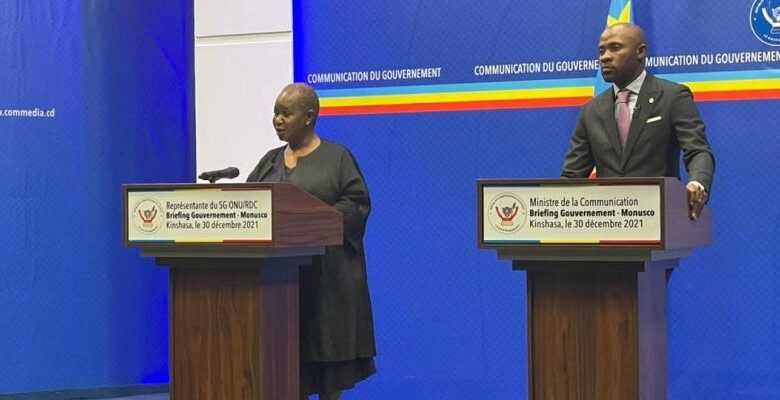Violence By Armed Groups In DR Congo Affecting Only 10% — UN
The United Nations Security Council has demanded that MONUSCO immediately withdraws from Tanganyika province.

Bintu Keita, the Special Representative of the UN Secretary General in the Democratic Republic of Congo and Chief of the United Nations Organisation Stabilisation Mission in the Democratic Republic of Congo (MONUSCO), says the reconstruction of the country is advancing and violence by armed groups now touches only 10 per cent of DR Congo.
Keita spoke during a joint press conference with Patrick Muyaya, the DR Congo Minister of Communication and Media, on Thursday, Dec. 30, in Kinshasa.
She declared that “the democratic and electoral processes which are still fragile are being reinforced, the national security forces are gaining in competence and in efficacy and the promotion and defense of human rights continue to be spread thanks to a lively and constructive civil society.”
“I hear people say MONUSCO works to justify its presence on Congolese soil: this is false. Nobody, and certainly not me nor your government, can be satisfied with the lengthy presence of foreign soldiers on Congolese soil, even if it continues to be necessary, and besides that, the dependence of the DR Congo on international humanitarian aid.”
Bintu Keita went on to say that she fully respects the right of everybody to criticise the UN Mission “but I wish with all my heart that we can change the usual narrative on our work, which also reflects negatively on the progress that has been made by your country” and also evoked the planned, coordinated and responsible departure of the MINUSCA from the country.
She argued that “to live in a responsible and sustainable way, we still have some work to do, in conformity with the wishes of the United Nations Security Council and your authorities.”
“We have to continue to consolidate the authority of the state on the totality of the national territory and create a protective environment for the population.”
A protective environment means the police are able to ensure the maintenance of order everywhere. Soldiers dedicated to the defense of borders after having neutralized national and foreign armed groups.
“A justice system available to solve differences in a peaceful way and put an end to impunity and basic social services, education and health in the first place, accessible to all.”
“Those are the fundamentals on which we are working with the authorities and our partners.”
The United Nations Security Council has demanded that MONUSCO immediately withdraws from Tanganyika province between now and the middle of 2022 and to consolidate its presence in Ituri, North Kivu and South Kivu while continuing with its good offices and its work of reinforcing the institutions at national level, as envisaged in the common strategy including what concerns the maintenance of an alert and rapid response unit.
Support Our Journalism
There are millions of ordinary people affected by conflict in Africa whose stories are missing in the mainstream media. HumAngle is determined to tell those challenging and under-reported stories, hoping that the people impacted by these conflicts will find the safety and security they deserve.
To ensure that we continue to provide public service coverage, we have a small favour to ask you. We want you to be part of our journalistic endeavour by contributing a token to us.
Your donation will further promote a robust, free, and independent media.
Donate HereStay Closer To The Stories That Matter




